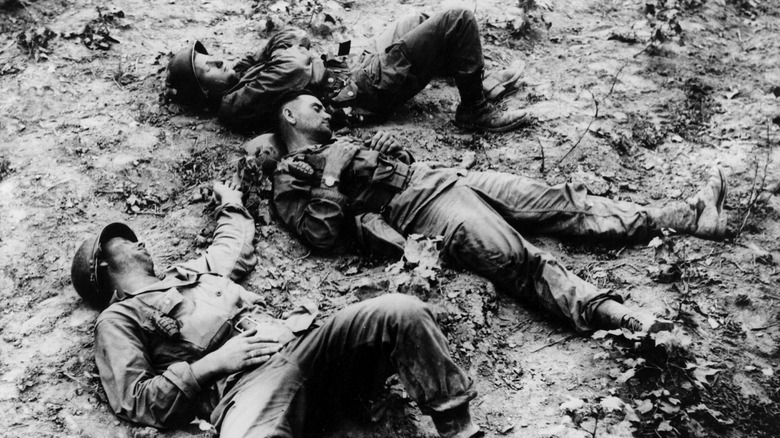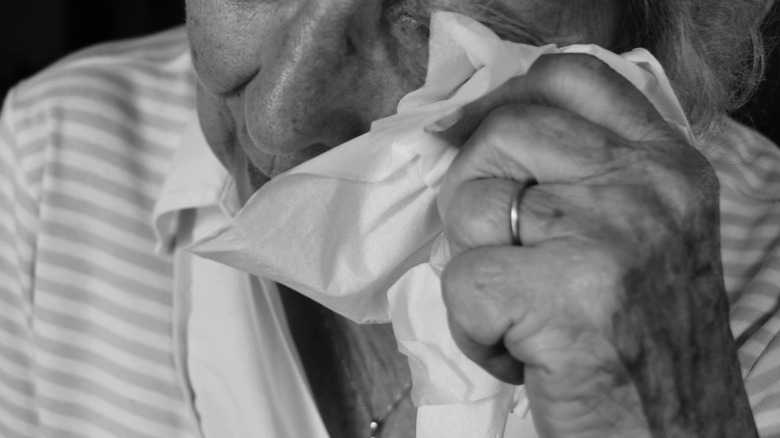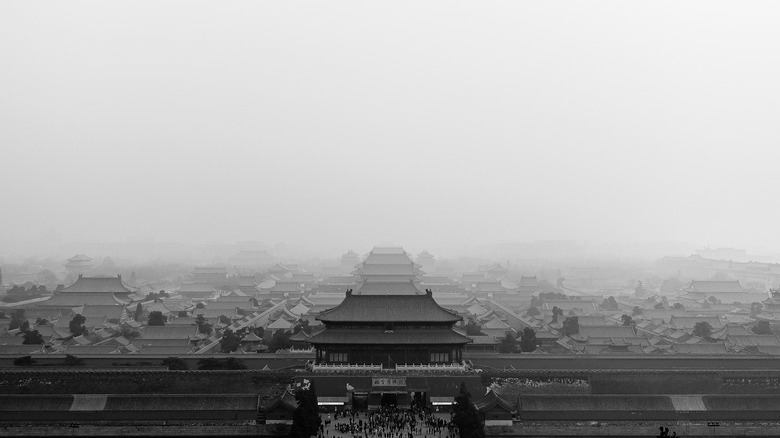The Truth About The US Defectors In The Korean War
Americans think about the Korean War so infrequently that the conflict has earned itself the nickname the "Forgotten War." But although the war is largely out of sight and mind in our collective memory of the second half of the 20th century, its ramifications are very real and have affected how diplomacy and conflict are conducted across the globe to this day. For one thing, the Korean War technically never ended, and the threat of North Korea's military and nuclear capabilities is still a major concern in the region. It was also the first time a U.S. president sent troops to fight without a declaration of war from Congress, and that constitutional requirement hasn't been met since, despite wars in Vietnam, Iraq, Afghanistan, and many other parts of the globe.
No war is truly forgotten, not by those who fight and survive them. And for some U.S. troops, the atrocities of the Korean War were too much for them to forgive the country that sent them to fight. According to The Graybeards, 21 American soldiers defected after the armistice agreement signed by the United States, North Korea, and China brought the fighting to an end in 1953. Some were pulled away from their home country due to the racial inequality and discrimination faced by Black people in Jim Crow era United States. Others were drawn by socialist ideals. Many, however, found the promises of communism to be as hollow as those of "liberty and justice for all" back home.
Clarence Adams became a communist propagandist in the Vietnam War
One of the most notable defectors in the Korean War was Corporal Clarence "Skippy" Adams, a Black man from Memphis, Tennessee, whose decision to defect to Communist China was based on the racial discrimination and violence he had experienced back home in the United States. In 2007, Adams published his memoir, "An American Dream: The Life of an African American Soldier and POW Who Spent Twelve Years in Communist China," in which he documented his involvement with the communist government there. He was captured by North Korea in 1950, and refused repatriation after the signing of the armistice.
During the Vietnam War, Adams recorded radio broadcasts that were played on the North Vietnamese propaganda station Radio Hanoi. In them, he urged Black American soldiers to refuse to fight. "You are supposedly fighting for the freedom of the Vietnamese," he said to them, "but what kind of freedom do you have at home, sitting in the back of the bus, being barred from restaurants, stores, and certain neighborhoods, and being denied the right to vote?" But his message wasn't intended to get them to defect to the communists. He said that his overriding message was to exhort them to "go home and fight for equality in America."
But Adam's days in China were numbered. As Time reported in 1966, Adams eventually became disillusioned with communism and life in China in general. He returned to the United States that year, saying, "I think that they were as happy to get rid of me as I was to leave." Adams died in 1999.
Morris Wills played college basketball in Beijing
Morris Wills was another U.S. soldier who was influenced by communist theory while in the POW camps. In his 1970 autobiography, "Turncoat: An American's 12 Years in Communist China," Wills explained that his initial assumptions of China and communism changed after his capture. "Before I was a prisoner, I thought China was a terrible tyranny where innocent people were shot and killed and put into prison," he wrote. "But what I got from them in camp was completely different. Everything was nice, sort of an orderly planned way for everyone to live together." So he went to one of his captors and said that he wanted to go to the country someday, and when it came time to be repatriated, Wills stayed behind and eventually made it to China.
There, he studied Chinese and played basketball at Beijing's Peking University. He worked as a translator and even married a woman there. They had a daughter together, and he brought his family to the United States in 1965. Using his Chinese language skills to his advantage, Wills secured a professorship in the East Asian Research Center at Harvard University. He died in 1999.
The 'dummy bunch': Otho Grayson Bell, Lewes Griggs, and William Cowart
Not all defectors were given opportunities in the big city. Some were sent to labor camps, as it was assumed they weren't intellectually up to the challenge of learning a language like Chinese. Otho Grayson Bell, Lewes Griggs, and William Cowart were among this group. According to The Graybeards, Bell would later tell a historian to whom he was recounting his experience that the three "were kind of the dummy bunch . . . They sent us to a collective farm, 'cuz we wasn't educated enough to learn Chinese."
But it probably wasn't much fun on the farms, and their fondness for their former enemies didn't last too long. After just two years, Bell, Griggs, and Cowart were the first defectors to return to the United States. Upon their return, they were arrested and jailed for 90 days, but despite the Army's attempts to court martial them, a judge ruled it could not, as they had already been dishonorably discharged from the U.S. Armed Forces.
Despite their lack of language skills and Bell's claim that they were dummies, they were still involved in communist propaganda during their time in China. According to FindLaw, Supreme Court records detail how they were involved in communist meetings and also recorded radio broadcasts and wrote articles for use as propaganda. Griggs died in 1984, and Bell in 2002, but what became of Cowart is unknown.
Lowell Skinner's mother begged him to come home
After the signing of the armistice, China gave the 23 U.S. soldiers who had said they wanted to refuse repatriation 90 days to really think about the decision. During that time, two decided defection wasn't for them. The United States sent the potential defectors messages from their families to try and convince them to return. Edna Skinner was desperate for her son Lowell to come back home. According to All POW-MIA, she sent him a recording of her voice asking him to do so. "Son, this is your mother," she said. "Please, Lowell, listen to me. You must come home. You are needed here, son."
But Lowell Skinner shocked his family and his home country when he announced in January 1954 that he was going ahead with his decision to refuse repatriation to the United States. He cited his pacifism and what he saw in the U.S. government as suppression of peaceful movements as the reasons he chose to go to China. "If we want to continue to fight for peace, we have to do it from abroad," he said. Over the next 10 years, he made a life in a Chinese city named Tsinan, where he married a schoolteacher and worked in a paper mill. But toward the end of the 1950s, he started getting homesick. Leaving his sick wife in China, he returned to Ohio in 1963, but did not receive a warm welcome. Hostility from those who recognized him ultimately forced him to change his name. He died in obscurity in 1995.
James Veneris took a Chinese name and participated in the Cultural Revolution
Of the 21 Korean War defectors, only a handful actually remained in China permanently. One of those was James Veneris. According to The Graybeards, he even changed his name to Lao Wen, witnessed the horrors of Mao Zedong's failed agricultural revolution known as the Great Leap Forward, and was accused of being a counterrevolutionary in the Cultural Revolution. However, despite experiencing such hardships, and a short trip to the United States in 1976, he made China his permanent home until his death.
All POW-MIA notes that Veneris watched several friends die of malnutrition during the Great Leap Forward, when ineffectual policy, inefficient food distribution, and natural disasters created the perfect storm for a famine that killed tens of millions of Chinese people from 1959 to 1962. During the violent Cultural Revolution of the 1960s and '70s, Veneris created posters promoting international unity, but the xenophobic nature of the movement cause some to suspect him of being a spy. He even divorced his second wife as a result of an argument caused by the polemic politics of the time.
Despite the hardships and the toll taken on his personal life (he ended up reuniting with his second wife after a failed third marriage), Veneris said he never regretted the decision to defect. "If I had to do it all over again," he said, "I'd do it in the wink of an eyelash." James Veneris died in 2004 and was buried in China.





